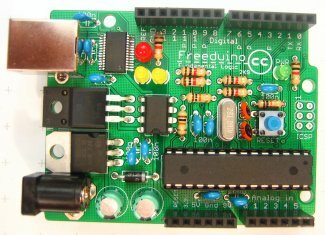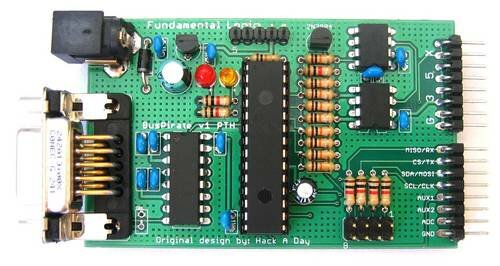Freeduino 2009 - a plain through hole modern 'duino (June 16, 2009)
This one's been waiting in the wings for a while. The Freeduino 2009 is a through-hole Arduino clone with Duemilanove level features like auto power-supply switching, reset on upload, and everything else you'd expect.

The !
Arduino Atmel Freeduino Kit store
Posted by spiffed at 5:47 PM
Introducing the Spiffie.org Bus Pirate PTH (March 25, 2009)

Hack A Day made an awesome prototyping and debugging tool called . The bus pirate can interface with most serial interfaces (SPI, I2C, RS232, JTAG, 1wire, etc) and is controlled by a simple serial terminal. If you have a pc with a serial port and a bus pirate, you can talk to most serial chips.
The latest revisions, though, are surface mount, which isn't so hot if you're just starting out, so we've taken their design and converted to entirely through hole parts with plenty of working space.
Go ahead and check out the Spiffie.org Bus Pirate PTH documentation and the .
When you're ready, , , or grab the sources and build your own.
| Full Kit | Bare PCB |
|---|---|
buspirate hackaday kit pth store through hole
Posted by spiffed at 3:43 PM | Comments (0)
Have a KB on me! (March 13, 2009)
Recently, Dave Brink proposed a smaller bootloader for the Arduino platform, while he specifically mentioned the ATmega328, the bootloader is common the common ATmega168. The new bootloader. created by a group of people, saves a full KiloByte of flash space over the regular bootloader, giving you 1024 more bytes of sketch space.
Go read about it now or just jump to the "use it" page!
We'll be shipping the new bootloader on our pre-programmed ATmegas and in our kits as they're updated. Don't worry, it's completely backwards compatible!
arduino bootloader software c embeded freeduino
Posted by spiffed at 1:35 AM
TC64x based fan controllers (March 3, 2009)

Based on microchips TC64x series of chips, these are easy to build, use, and understand temperature sensitive fan controllers.
Checkout their project page or directions, then find them in the store or build your own from the sources.
fan kit microchip SingleSided store
Posted by spiffed at 4:07 PM | Comments (0)
Fading LED default test sketch (February 12, 2009)
For some time now, every Arduino bootloaded ATmega we've shipped has come with a default testing sketch that slowly pulses the LED on and off in a cyclic fashion.
A "fading" sketch using hardware PWM is included in the IDE distribution under Examples→Analog→Fading to fade an LED, but the Pin 13 status LED isn't connected to a hardware PWM pin.
The answer is to abuse the delayMicroseconds call to create crude software PWM. By setting the pin high; delaying; setting the pin off; and delaying for a different period, we can change the brightness simply by altering the delay.
One catch to this approach, is if you use purely the on/off delay to control the PWM speed, you're left with either a very fast fade or an unsettling flashing. Instead we keep the delay between 4 and 250 µs (about 3 to 4kHz) and add an additional loop around each on/off loop to set the fading speed. --You can't set the delayMicroseconds code to 0 or you'll get an unexpectedly long delay.
Finally, we use the serial port to output a rising count, just to ensure the serial port works.
Continue reading "Fading LED default test sketch"
Arduino Atmel Code Freeduino Kit
Posted by spiffed at 11:11 AM
[email protected]